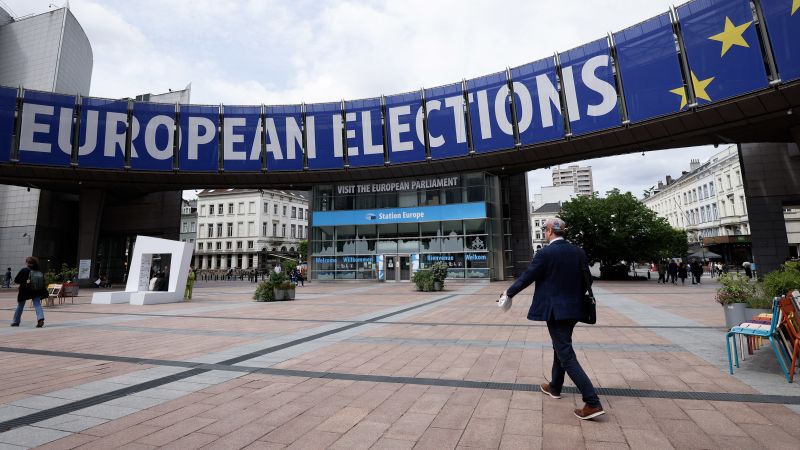CNN
—
Far-right parties are predicted to win a record number of seats in the European Parliament, a result that, if confirmed, would deliver a stinging rebuke to Brussels’ political mainstream and add uncertainty to Europe’s future direction.
After three days of voting across the European Union’s 27 member states, an exit poll showed that far-right parties were set to win around 150 of the parliament’s 720 seats, which will likely make it harder for mainstream parties to form majorities needed to pass laws.
In a speech late Sunday, European Commission President Ursula von der Leyen said the results showed her European People’s Party (EPP) – predicted to secure the most seats – could still act as an “anchor of stability,” but called on her political allies to help guard against extremist parties.
“The center is holding. But it is also true that the extremes on the left and on the right have gained support, and this is why the result comes with great responsibility for the parties in the center,” she told an audience in Brussels.
The full results will trickle in on Monday, when the process of coalition-building will begin as Europe’s centrists seek to put aside their differences to see off a resurgent far right.
Most of the far-right gains were concentrated in countries that elect large numbers of seats: France, Italy and Germany.
After an exit poll showed Marine Le Pen’s far-right National Rally (RN) party is expected to trounce his own candidates, French President Emmanuel Macron dissolved his parliament and called a risky snap election, with the first round on June 30.
Initial results showed RN securing 31.5% of the vote, more than double the share of Macron’s Renaissance Party, which scraped to second place on 15.2% of the vote, just ahead of the Socialists in third with 14.3%.
In a celebratory speech at the RN headquarters before Macron’s shock announcement, party leader Jordan Bardella said the “unprecedented defeat for the current government marks the end of a cycle, and Day 1 of the post-Macron era.”
Stephane Lemouton/SIPA/AP
Macron and First Lady Brigitte Macron at the Touquet polling station, for the European elections, June 9, 2024.
Like Macron, German Chancellor Olaf Scholz also suffered a stinging blow in the exit poll, as his Social Democrats (SD) scored their worst-ever result of 14%, while the mainstream Christian Democrats Party (CDU) came top with 29.5% of the vote and the far-right Alternative for Germany (AfD) came second with 16.5%.
While the results will shape the political direction of the EU for the next five years, this cluster of national elections is often seen as a de facto referendum on the incumbent domestic governments, which could spell trouble for Macron in France’s 2027 presidential election and for Scholz in Germany’s federal elections next year.
A lot has changed in Europe since the last parliamentary elections in 2019, after Britain left the bloc in 2020 and Russia invaded Ukraine in 2022, putting much of the continent on a war footing as it sought to send desperately needed supplies to Kyiv and member states shored up their own defenses.
“Of course, this election does not take place in a vacuum. The world around us is in turmoil. Forces from the outside and from the inside are trying to destabilize our societies, and they are trying to weaken Europe,” von der Leyen said.
Annegret Hilse/Reuters
Alternative for Germany (AfD) party co-leaders Alice Weidel and Tino Chrupalla cheer the exit poll in Berlin, Germany, June 9, 2024.
While the far-right surge may further complicate Brussels’ bid for unity, the far-right parties themselves remain relatively divided. The AfD is politically homeless: it was removed from the far-right Identity and Democracy (ID) party after its main European candidate, Maximilian Krah, said he did not consider all members of the Nazi group the SS to be criminals. Several other far-right parties are among the non-aligned (NI) group, predicted to secure 45 seats.
Responding to the exit poll, Roberta Metsola, president of the European Parliament, said the results showed Brussels’ political establishment needed to “understand how people voted” and take decisions “that have an impact on citizens’ daily lives.”
“We can see that the constructive, pro-European center has held,” she said, but stressed there remains “a responsibility of the groups to come together to form a majority.”

